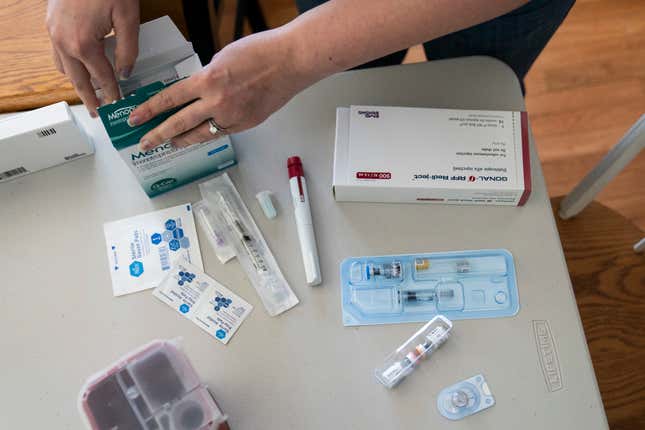The Ostensibly Pro-Life Act of IVF Is Now Endangered
Without Roe, trying to have children through in vitro fertilization could come with risks for patients and fertility clinics.
AbortionPolitics
Illustration: KTSDESIGN
In vitro fertilization, or IVF, begins when an egg meets sperm on a petri dish in a lab. Days after fertilization, the fertilized eggs, now teeny embryos, are frozen for later use, or inserted into a needle and placed inside the uterus of the person who wants to have a baby. If the embryo implants into the uterine wall, pregnancy occurs, and the procedure is a success—but the chance of IVF being successful stands at just 50 percent, and that’s only when you’re 35 or under. Fertility experts often refer to IVF as a numbers game requiring multiple attempts, and naturally, multiple embryos. Playing the game, so to speak, is among the most effective forms of assisted reproductive technology, but it can also be a grueling, demoralizing process—especially for couples or individuals who may already be grappling with the mental toll of long-term fertility struggles.
Now, in a post-Roe v. Wade world, a failed IVF cycle could come with more than disappointment. It could carry criminal risk.
Roe was brutally overturned in the Supreme Court’s Dobbs v. Jackson Women’s Health decision Friday. Even before the ruling, medical experts expressed concern that state abortion bans could restrict IVF access, and legal experts wondered if IVF providers and patients could become exposed to criminal charges or other legal repercussions. If a state’s abortion ban implicitly—or explicitly—recognizes embryos as children, as some do, routine embryo disposal in the IVF process and failed IVF cycles could even be prosecuted as manslaughter. With Roe reversed, as many as 34 states could ban or restrict IVF, according to research by the health care startup Power. These states include the 22 with pre-Roe abortion bans or trigger bans, as well as 12 other states that don’t explicitly guarantee the right to an abortion in their state constitutions, a spokesperson for Power explained.
Elizabeth Nash, the principal policy analyst for state issues at Guttmacher Institute, told Jezebel that IVF will be “most at risk” in states with abortion bans that explicitly include “life begins at conception” language, because “this language defines ‘child’ as starting at fertilization, and it doesn’t look like any of [the bans] specifically have exceptions for IVF.” According to Nash’s research, five states with trigger bans that include this language are Arkansas, Kentucky, Louisiana, Missouri, and Texas. As of this writing, nine states—Alabama, Arkansas, Kentucky, Louisiana, Missouri, Oklahoma, South Dakota, Texas, and Utah—are enforcing their trigger bans.

On top of these abortion bans, Nash noted that nearly 40 states have fetal homicide laws that accord embryos and fetuses personhood by recognizing them as homicide victims if a pregnant person is killed or harmed, and loses their pregnancy. These laws were originally created to address the issue of homicide as the leading cause of death for pregnant people but have been co-opted by anti-abortion activists and prosecutors to humanize fetuses and cast pregnant people as murderers. Between 2006 and 2020, nearly 1,300 pregnant people—a disproportionate number of them people of color—faced criminal charges for their pregnancy outcomes, in cases often involving fetal homicide laws. Notably, several pregnant people faced criminal charges, including manslaughter, following stillbirth.
-

-

-

-

-

-

-

-

-

-

-

-

-

-

-

-

-

-

-

-

-

-

-

-

-

-

-

-

-

-

-

-

-

-

-

-

-

-

-

-









































